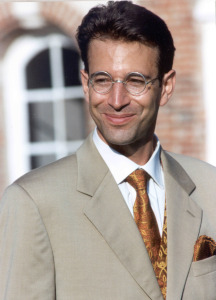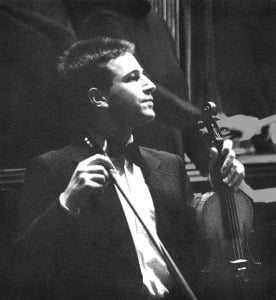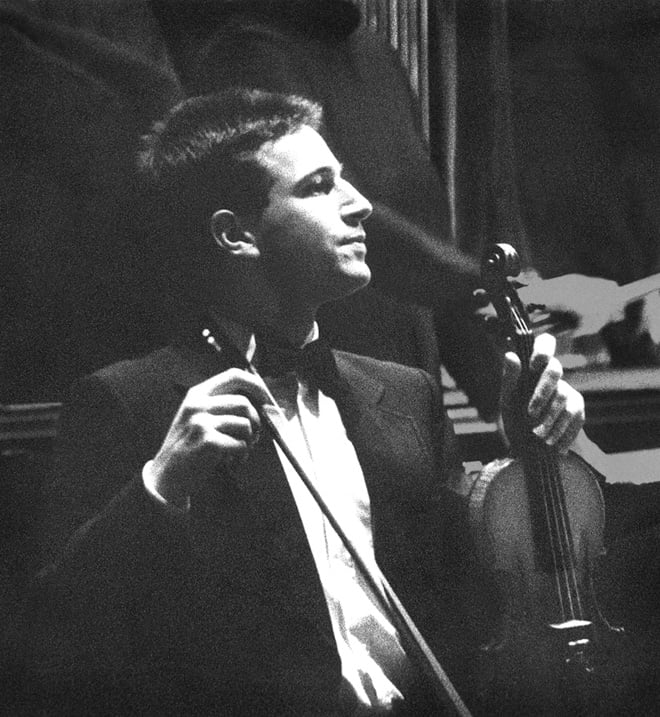
I could not believe my friend had donned a bro-tank for the Daniel Pearl World Music Days Concert, an annual performance held in honor of the Stanford graduate-turned-journalist who was slain in Pakistan while investigating the supposed connection between Al-Qaeda and “shoe bomber” Richard Reid. I glanced around Memorial Church and the buzzing audience — no one seemed to notice the out-of-place tank, so that was a good sign.
As the audience settled, Rabbi Patricia Karlin-Neumann offered introductory remarks for the annual concert in honor of Pearl, who was killed in 2002.
“Through his work, Danny had a way of bridging divides and bringing humanity closer,” Karlin-Neumann said.
On stage, the St. Lawrence String Quartet and the Stanford Chamber Strings, along with oboist James Austin Smith and baritone Kenneth Goodson, led an engaging performance. Lead SLSQ violinist Geoff Nuttall directed the strings in a lively dialogue with the soloists.
But before they picked up their instruments, Michelle Pearl, Daniel’s sister, commented on the power of musical performance.
“Every year, I am amazed by the incredible beauty humanity is capable of,” she said. “When we leave, we carry that beauty out to the world.”
The beauty was there, all right. The program opened up with a spirited rendition of the Telemann Concerto for Oboe in E minor, with Nuttall leading a careful, yet graceful, introduction into the “Andante,” followed by a sparkling “Allegro,” with the oboe dancing merrily among the strings. The performance progressed into the soaring phrases of the “Largo”, the notes fused in an expression of sublime control — which then subsequently dove into a fiery, yet articulated, second “Allegro.”

The chemistry between the performers was evident. Bows bounced up and down in sync as the musicians eyed each other and even seemed to breathe together, inhaling at the beginning of a phrase and exhaling at the end of an especially intense section. Nuttall and Smith cocked their heads toward each other as they engaged in an animated interchange of the melody.
Next, Christopher Costanza, sitting below the steps of the stage so that his chair was only a few feet away from the front row, gave an intimate and expressive performance of the Bach Suite No. 1 in G Major for solo cello. The music glided in elegant arcs over the audience, echoing off the pillars and filling the wide expanse of space. He wove through the famous “Prelude” into the winding melodies of the “Allemande,” making every note — brief or long — resonate throughout the church while maintaining an impressive dynamic range. After performing the playful “Courante,” slow “Sarabande,” and delightful “Minuets,” Costanza completed the “Gigue” in quiet triumph, the sonorous tones melting into the air.
For the finale, Goodson joined the ensemble on stage, adding his booming voice to the already vigorous musical discussion. At times, Nuttall focused on Goodson, determined to match Goodson precisely in Bach’s “Ich habe genug.” But there was no need to worry: The cohesion of the ensemble was impressive, especially in the third “Aria,” in which the strings galloped effortlessly up and down phrases under Nuttall’s rapid tempo.
After the concert, the audience offered the musicians a standing ovation. I filed out of the sanctuary in a state of subdued wonder. As we passed the rows of pews, even my bro-tanked friend expressed respectful admiration.
As we walked outside alongside the other concertgoers, the notes still ringing in our ears, I recalled the words of Karlin-Neumann: Like Pearl himself, music certainly had a way of “bridging divides and bringing humanity closer.” Having seen the St. Lawrence String Quartet bring bro tanks and oboes together, I left the concert without a doubt that what Karlin-Neumann had said was true.
Contact Marisa Lin at mlin3 ‘at’ stanford.edu.
